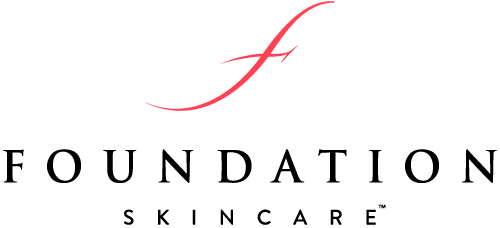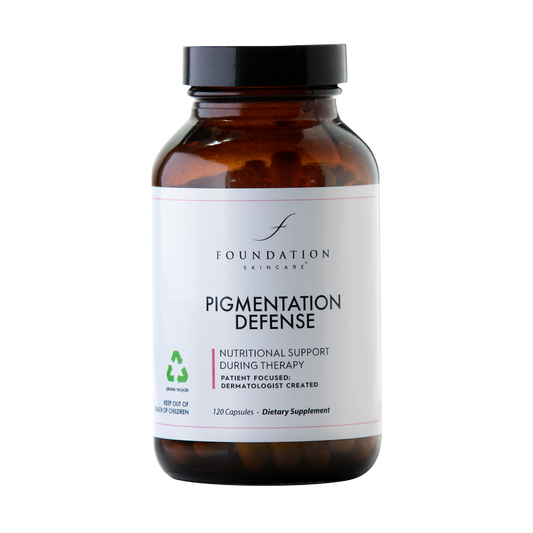Learn more about what causes skin pigmentation disorders, how to treat unwanted skin pigmentation, and the best products to add to your routine.
What Is Skin Pigmentation?
Skin pigmentation refers to our skin color caused by how much melanin we have. The more melanin, the darker our skin, and vice versa. Skin pigmentation disorders like hyperpigmentation occur when the cells that produce our melanin (melanocytes) become damaged. Whether caused by sun exposure, hormones, or acne, unwanted skin pigmentation may appear as brown, black, gray, red or pink spots or patches. Or you may have light spots where there is a lack of melanin, known as vitiligo. Overall, unwanted skin pigmentation can make you feel like your skin has an uneven tone or a blotchy look.
Main Causes Of Unwanted Skin Pigmentation
There are many potential causes for unwanted skin pigmentation. They include:
- Genetics
- Inflammation
- Pregnancy (melasma)
- Hormonal imbalance
- Birth control pills
- Sun exposure
- Acne
- Injuries to the skin
Best Supplements for Dark Spots & Discoloration
Our skin, hair, and nails rely on a variety of vitamins and minerals to remain healthy. Typically, a well-rounded diet will provide these nutrients, but adding supplements proven to support healthy skin maximizes your efforts. This is especially true if you are struggling with dark spots and discoloration. Supplements rich in antioxidants can help your body fight free radicals that damage skin cells while brightening skin.
Find out what supplements help clear skin pigmentation and discoloration as proven in studies and clinical trials.
1. Vitamin A
Vitamin A plays a crucial role in skin and hair health, immunity, and even reproductive health. There are two types: preformed vitamin A, or retinoids, which are found in animal products like meat, poultry, and dairy, and provitamin A, or carotenoids, which are found in plant products.
Vitamin A promotes cellular turnover, which protects your skin from environmental factors like UV radiation from sun exposure, a main contributor to dark spots.1 But that’s not where vitamin A’s benefits stop. Studies show that retinoids, or preformed vitamin A, also helps to stimulate collagen when applied topically, reducing the appearance of fine lines and wrinkles.2 It can also adequately exfoliate the skin to remove dead skin cells and excess oil, which reduces acne and acne scarring.
Ways to take Vitamin A
It is possible to get the vitamin A you need from your diet, sourcing retinoids from foods like salmon, beef liver, and eggs, and getting your carotenoids from carrots, tomatoes, sweet potatoes, and some fruits. But if you need more support, finding a supplement that combines retinoids and carotenoids can be useful. The recommended daily allowance, according to the Mayo Clinic, is 900 micrograms (mcg) for adult men and 700 mcg for adult women.3 To maximize its absorption, it’s recommended to take your vitamin A supplement alongside healthy fats. For instance, if you have it in the morning, consume it with nut butter or avocado toast.
To boost the effects, pair your supplement with a topical product containing retinoids like Foundation Skincare’s Night Renewal Cream. This will help you achieve the benefits of vitamin A from both the inside and the outside.
2. Vitamin B3
Vitamin B3, or niacin, helps your body convert nutrients into energy, creates and repairs DNA, and has antioxidant properties to protect against environmental stressors.4 Your body can also convert niacin supplements into niacinamide, another form of vitamin B3 known for its skin-clarifying effects.
As a potent antioxidant, niacinamide rebuilds healthy skin cells while also protecting your skin from sun damage. Studies have found niacinamide to be helpful in lightening dark spots and improving fine lines and wrinkles, potentially due to enhanced collagen production.5
Ways to take Vitamin B3
Vitamin B3 is found in many foods, such as meat, fish, milk, eggs, green vegetables, and cereals. But if you need more support, using a vitamin B3 supplement can be helpful. The recommended daily allowance is 16 milligrams daily for men and 14 mg for women.6 Just be sure you don’t exceed dosage and ask your doctor if you’re not sure. Some experts recommend not exceeding 35 mg daily to avoid unpleasant side effects.7 To ensure you’re getting sufficient vitamin B3, consider Foundation Skincare’s Spectrum supplement, which contains vitamin B3 in the form of nicotinamide alongside other plant-based antioxidants and key vitamins proven to improve skin health. Nicotinamide, also known as niacinamide, is a water-soluble amide form of niacin or vitamin B3.
To boost the effects of niacinamide on the skin, you can pair Spectrum with Foundation Skincare’s topical Niacinamide Lotion. This combination will ensure your skin is getting the nutrients it needs to fade and prevent hyperpigmentation, from within the body and directly to the skin.
3. Vitamin C
Many of us associate vitamin C with its immune-boosting properties, but this powerful vitamin is also one of the best natural supplements for pigmentation. Its antioxidant properties have been shown to defend against the damage caused by UV light and lighten dark spots, while also boosting collagen to smooth out wrinkles.8 When combined with vitamin E, vitamin C also helps to alleviate the inflammation induced by excessive UV exposure.
Some research also shows vitamin C to have a complex relationship with melanin.9 By inhibiting the action of an enzyme called tyrosinase, vitamin C actually reduces melanin formation. It also impacts the perifollicular pigment to thoroughly reduce dark patches on the skin.
Ways to take Vitamin C
Like the other vitamins listed above, it’s fairly easy to get vitamin C from your diet. It’s found in citrus fruits, strawberries, tomatoes, bell peppers and even cruciferous vegetables like broccoli and brussel sprouts. But if you need more support, using a vitamin C supplement can be helpful in improving skin health and boosting your immunity. The recommended daily allowance is 90 mg daily for men and 60 mg daily.10 To ensure you’re getting the right amount of vitamin C for healthy skin, consider taking Foundation Skincare’s Pigmentation Defense, which contains 100% of the daily allowance of vitamin C along other antioxidants and vitamins proven to reduce pigmentation, including vitamin E, ginkgo biloba, and Polypodium Leucotomos extract.
Pair Pigmentation Defense with topical vitamin C for even more support with a product like Foundation Skincare’s Vitamin C Lotion. This product contains 20% concentration that is higher than most available topical options. Applying and ingesting this essential vitamin doubles your efforts for even more defense against harmful UV rays, less inflammation, and increased moisture.
Pigmentation Defense
4. Spectrum
Another way to get the nutrients your skin craves is to take a multivitamin. Foundation Skincare’s Spectrum supplement is an exclusive skin renewal formulation that combines plant-based antioxidants and key vitamins into one convenient capsule. These include nicotinamide (a type of vitamin B3), vitamin D, Milk Thistle leaf, and Polypodium Leucotomos leaf. Use Spectrum daily to help clarify and protect optimal skin health against damage caused by environmental toxins and the sun. This damage shows up as wrinkles, changes in pigmentation, degradation of the skin’s immune system, destroyed collagen, and skin cancer. Each ingredient is carefully chosen to help minimize these effects. Here’s how each ingredient works:
- Polypodium Leucotomos leaf: With strong antioxidant and anti-inflammatory effects, this tropical fern helps to defend against damage caused by UV exposure.11
- Nicotinamide: This form of vitamin B3, which is also known as niacinamide, repairs skin cells and reverses DNA damage caused by UV light on keratinocytes. It may also help to protect against certain types of skin cancer.12
- Milk Thistle leaf: With its active silymarin, this flavonoid with antioxidant properties has been shown to protect against the harmful effects of sun exposure, slow premature aging, and control inflammation.13
- Vitamin D: We get most of our vitamin D from the sun, but when we’re trying to avoid the damaging effects of UV light, the last thing we want to do is spend too much time basking in it. Taking a supplement helps us benefit from the antioxidant and anti-inflammatory effects of vitamin D which are known to slow premature skin aging, without the sun exposure.14
How to take FS Spectrum
Take FS Spectrum as follows: 2 capsules daily with 8 oz. of water. Always use sun protection when using this supplement, as it is not a substitute for proper sun-safe habits. If you’re pregnant or nursing, consult with your doctor first.
5. Pigmentation Defense
Containing a blend of antioxidants, vitamins, and herbs, Foundation Skincare’s Pigmentation Defense helps to improve visible signs of skin discoloration and pigmentary disorders through nutritional support. Key ingredients like ginkgo biloba, ascorbic acid, and vitamin E support skin cells while balancing natural melanin production. Here’s how each ingredient works:
- Polypodium Leucotomos leaf: Like the Spectrum supplement, Pigmentation Defense also contains this tropical fern extract, which helps to reduce the damaging effects of UV light.
- Ginkgo biloba: A mainstay in Traditional Chinese Medicine, ginkgo biloba helps to reduce unwanted pigmentation by mitigating oxidative stress to skin cells.15
- Alpha Lipoic Acid (ALA): This naturally occurring antioxidant isolates free radicals to improve UV-induced pigmentation while thickening the epidermal layer.16
- Ascorbic Acid: Ascorbic acid is a form of vitamin C which helps to repair tissues with its antioxidant properties as mentioned above.
- Vitamin E: Another potent antioxidant, vitamin E helps to restore pigmentation, especially when used alongside UV light therapy. It has strong photoprotective, firming, hydrating and even anti-aging properties.17
How to take FS Pigmentation Defense
Take FS Pigmentation Defense as follows: Take two capsules daily with an 8 oz. glass of water. For optimal results, we recommend that you use Pigmentation Defense and daily sunscreen as part of your skincare routine.
6. Vitamin E
As mentioned above, vitamin E is a powerful antioxidant that helps to improve pigmentation when used alongside UV therapy. Its photoprotective, firming, and hydrating properties reduce the signs of premature aging while acting as a free radical scavenger. In one animal study, both topical and oral vitamin E were shown to be as effective at reducing chronic skin damage caused by UV irradiation, as proven by less inflammation and pigmentation and by later onset and lower incidence of skin cancer.18
Ways to take Vitamin E
Obtaining vitamin E from your diet would entail consuming foods like sunflower seeds, almonds, peanuts, spinach, pumpkin, red bell pepper, and asparagus. But if you need more support, using a vitamin E supplement can allow you to benefit from this vitamin’s antioxidant qualities to improve skin health. The recommended daily allowance is 30 IU, which is the amount offered in Foundation Skincare’s Pigmentation Defense supplement.19
Along with using supplements for nutritional support, practicing healthy skincare habits will help you maintain a radiant, youthful complexion. But just as important is reducing sun exposure and practicing sun-safe habits. Learn more about how to reduce unwanted pigmentation, wrinkles, acne, and more in the FS Journal.
References:
-
https://www.healthline.com/health/vitamin-a-for-skin
-
https://www.ncbi.nlm.nih.gov/pmc/articles/PMC6791161/
-
https://www.mayoclinic.org/drugs-supplements-vitamin-a/art-20365945
-
https://www.hsph.harvard.edu/nutritionsource/niacin-vitamin-b3/
-
https://www.ncbi.nlm.nih.gov/pmc/articles/PMC2921764/
-
https://www.webmd.com/diet/supplement-guide-niacin
-
https://medlineplus.gov/druginfo/natural/1534.html
-
https://www.ncbi.nlm.nih.gov/pmc/articles/PMC5579659/
-
https://www.ncbi.nlm.nih.gov/pmc/articles/PMC7802860/
-
https://www.sciencedirect.com/science/article/pii/S0002916522044136
-
https://www.rxlist.com/polypodium_leucotomos/supplements.htm
-
https://www.nejm.org/doi/full/10.1056/nejmoa2203086
-
https://www.medicalnewstoday.com/articles/320362#benefits
-
https://www.ncbi.nlm.nih.gov/pmc/articles/PMC3583884/
-
https://www.ncbi.nlm.nih.gov/pmc/articles/PMC3455891/
-
https://pubmed.ncbi.nlm.nih.gov/30698882/
-
https://www.ncbi.nlm.nih.gov/pmc/articles/PMC7827176/
-
https://pubmed.ncbi.nlm.nih.gov/11341050/
-
https://lpi.oregonstate.edu/mic/multivitamin-mineral-supplements





